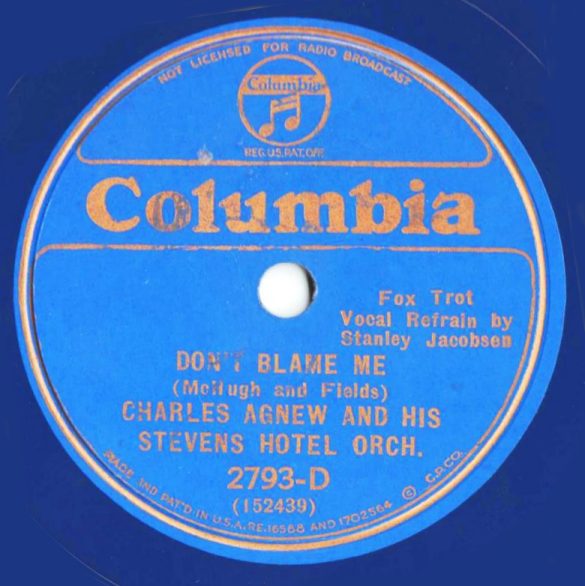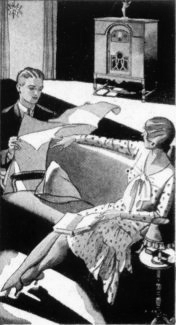“Don’t Blame Me”
Charles Agnew And His Stevens Hotel Orch.
1933 (Columbia 2793 D mx 152439)
Don’t Blame Me – Charles Agnew And His Hotel Stevens Hotel Orch
“Trouble In Paradise”
Charles Agenew And his Stevens Hotel Orch.
1933 (Columbia 2793 D mx 152411)
Trouble In Paradise – Charles Agnew And His Hotel Stevens Orch
Note: Today’s update comes courtesy guest contributor Matt From College Station who provides both the recordings and the commentary below.
It is my pleasure to present two recordings from a completely forgotten depression era dance orchestra. A good number of excellent titles from the early 1930s, particularly on Columbia, are overlooked even by fans of 1920s and 1930s music. This is perhaps because of their rarity and lack of availability in digital formats.
The recording selection for this post comes from the only session of Charles Agnew and his Stevens Hotel Orchestra. They cut only four sides on July 25, 1933. These titles are sweet and sophisticated, but not sappy or syrupy. “Don’t Blame Me,” a popular hit in 1933, is a particular favorite of mine due to the sax solo during the verse being very skillfully done. This was his most popular recording, with a review in the New York Times describing it as “richly played.”
“Trouble in Paradise” does hold its own, but is the weaker of the two sides. Stanley Jacobson delivers spot on vocals in the falsetto style popular at the time.
Although few recordings exist of this band, the quality of the arrangements and instrumentation suggest a very skilled and successful orchestra. In fact, Charles Agnew led an excellent “society” band in 1930s Chicago and played such distinguished venues as the Aragon Ballroom and Edgewater Beach Hotel. His band was popular on the NBC radio network throughout the 1930s. He also toured throughout the Midwest during the 1930s and 1940s. In the late 1950s, he switched to a smaller instrumental group format. He died of cancer in 1978 at the age of 77, after being retired from the business for about 10 years.
– Matt From College Station


 Radio Dismuke
Radio Dismuke
It was really swell of you to make this available to Dismuke, and we the appreciative listeners. Thanks, Matt.
We know that on these Columbia’s of this era there are no side differentiations, so we don’t know which Columbia might have intended to be the ‘A’ one but, if they had been, and I had been assigning such back then, I would have without any doubt assigned the ‘A’ side to “Trouble In Paradise,” as I believe it to be the one stronger executionally as well as compositionally, hands-down. Also, the orchestration for this side seems more fully worked-up and finished, than for the other.
Also, did I miss the presence of a “falsetto style” as you suggested was present, in either of these gorgeous melodies? I’ve listened to them over and over (gees, too bad we can no longer down-load stuff anymore, huh?) and I hear only good-and-solid, undoubtedly sincere tenor work, of a better-than-usual order. (Or, maybe it is that I am just losing my ‘ear’?)
Well, nevertheless regarding all that, thanks again, Matt & Dismuke.